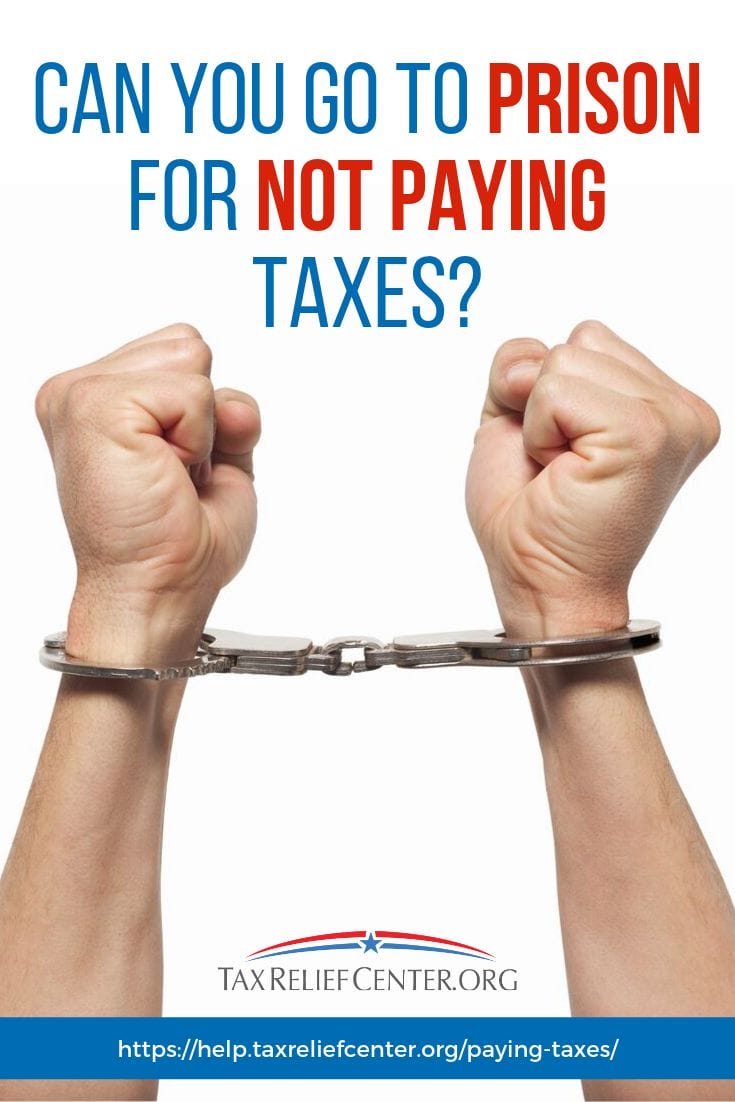Here’s what taxpayers need to know about not paying taxes and the possibility of serving time.
RELATED: 9 IRS Penalties You Could Be Facing After An Audit
In this article:
- How Does the IRS Ensure the Success of Their Collection Efforts?
- How Does the IRS Penalize Those Who Are Not Paying Taxes?
- What Options Are There for Taxpayers to Resolve Unfiled or Unpaid Taxes?
- Can You Go to Jail for Not Paying Taxes?
Is Not Paying Taxes a Jailable Offense?
How Does the IRS Ensure the Success of Their Collection Efforts?
The IRS exists solely to collect taxes. The agency’s core objective is basically the entire country’s lifeline.
In order to effectively carry out its duties, the IRS follows tried and tested means of pursuing back taxes. These include wage garnishment, tax liens, and tax levies.
Via wage garnishment, a certain portion of a taxpayer’s salary goes directly to the IRS. Up to 15% of an employee’s monthly income may be legally seized by the agency, depending on such variables as the taxpayer’s number of dependents.
Meanwhile, tax liens and levies give the IRS rightful claim to any existing assets of value owned by a taxpayer. Here, “assets” cover both liquid and non-liquid assets.
Assets of value may include bank accounts, vehicles, and houses, among others. Should a taxpayer fail to settle their tax debt, these assets may be seized by the IRS.
Also, in the event of Earned Income Tax Credit (EITC) granting a taxpayer sizeable refund, the amount goes to paying their tax debt. Any amount left after deduction of the tax credit will then be refunded.
For example, if a taxpayer qualifies for a $5,000 tax refund but they have outstanding tax debt from a previous fiscal year that amounts to $4,500, they will only receive a refund of $500 from the IRS. The rest will automatically be seized by the agency as a tax payment.
On top of these agency-administered penalties, inconveniences may also result from failure to file returns or not paying taxes. For instance, a delinquent taxpayer may encounter difficulties in various legal transactions, such as when filing for bankruptcy.
Filing for bankruptcy (both Chapters 7 and 13) requires that tax returns have been filed for the last two fiscal years.
How Does the IRS Penalize Those Who Are Not Paying Taxes?

The IRS has systems in place to ensure that their collection efforts consistently yield commendable results. At the top of this list is the imposition of penalties.
For taxpayers, filing returns and paying taxes on time prove more practical. That is, compared to receiving penalties and interests due to late returns filing and payment.
These penalties and interests can easily accumulate. They can exacerbate what is already a difficult financial situation.
For instance, late tax return filing is subject to a fine of 100% of your total tax debt, or a minimum penalty of $205. These penalties apply to taxpayers who file their returns 60 days after the deadline.
Meanwhile, separate penalties cover late tax payment. These penalties amount to 5% of a taxpayer’s delinquent debt each month it remains unsettled.
A tax debt of $10,000 will then incur a monthly interest of $500. This penalty will stay in place until the entire amount of tax debt has been paid.
To avoid having to pay exorbitant penalties and interest rates on top of your owed taxes, it is best for taxpayers to pay what they can when they can. Or, better yet, contact the IRS to discuss tax relief options.
RELATED: Your Passport May Be Revoked Due To Delinquent IRS Taxes
What Options Are There for Taxpayers to Resolve Unfiled or Unpaid Taxes?
An array of tax relief options exists for taxpayers who have failed to file their returns or pay their taxes on time. These options include an installment agreement, Offer in Compromise, and the Currently Not-Collectible (CNC) status.
Via an installment agreement, a taxpayer and the IRS decide on a practical payment scheme. This depends on the taxpayer’s current income and existing assets.
Late returns must still be filed for an installment agreement with the IRS to be granted. The IRS Form 9465 must be accomplished for this purpose.
Meanwhile, both the Offer in Compromise and Currently Non-Collectible programs serve those in dire financial predicaments. These tax relief options seek to aid taxpayers to bounce back from whatever economic difficulty they currently face.
For an Offer in Compromise (Form 656) to be accepted by the IRS, the agency must ascertain that a taxpayer’s offer exceeds their capacity to pay. As for the Currently Not-Collectible (CNC) Status, taxpayers who prove to the IRS that paying their back taxes will put them in immense financial hardship may benefit from it.
Can You Go to Jail for Not Paying Taxes?
As mentioned earlier, the IRS exists to collect taxes. Putting delinquent taxpayers in prison defeats this very purpose.
After all, how can the agency pursue tax debt from an incarcerated person? Rest assured, it is not on the agency’s list of priorities.
However, there are instances when the IRS has no choice but to consider prison time as a viable punishment for delinquent taxpayers. This applies to those who purposefully and knowingly try to evade taxes.
Tax evasion as a crime does not limit itself to the debtor. Anyone who helps another person (debtor) to carry out tax evasion will also be considered legally liable for the crime.
Tax evasion and failure to file tax returns have a six-year statute of limitations. It starts on the day of filing missing returns.
Imprisoned taxpayers due to uncollected tax debts are a rarity. However, they do exist.
With that said, it is in every taxpayer’s best interest to never neglect their tax duties. You don’t have to worry about going to jail if you have clean intentions and a spotless tax return. The IRS will be more understanding of financial hardship, but they will wield the full power of the law over those who fully intend to skirt the system and commit fraud or tax evasion.
Tax Evasion Definition: Any action/s taken to evade tax assessment on the state or federal levels.
Not paying your taxes is a non-jailable offense if purposeful tax evasion has been ruled out. This goes without saying that you should still make it a point to file your returns and pay your taxes on time to avoid IRS penalties.
For further questions, please share them in the comments section below.
If you owe back taxes, visit taxreliefcenter.org for more information about tax relief options.
Up Next:
- 11 Tax Sins Not To Commit To Avoid Tax Fraud Charges
- Delinquent Taxes | Everything You Need To Know
- Trump’s Tax Cuts | What You Need To Know And How It Affects You


